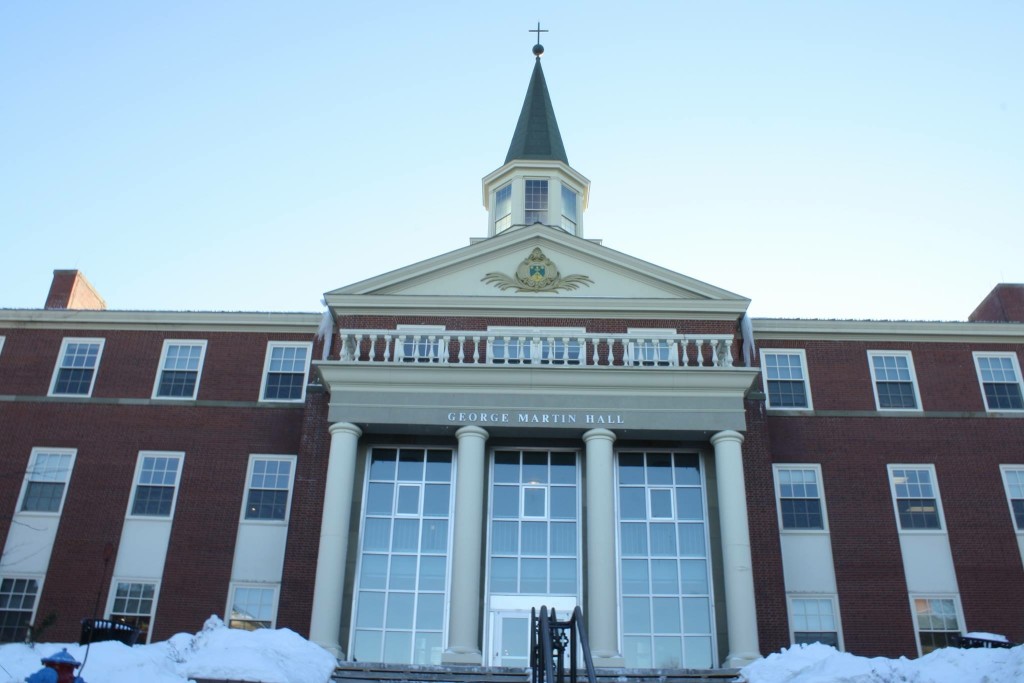St. Thomas University’s Human Rights Week took place Feb. 6 to 10 with a focus on diversity and inclusion, coinciding with the announcement of the 50th anniversary celebrations of the New Brunswick Human Rights Act.
Third-year student Rachel Slipp studies human rights at STU. She said she thinks it’s great the university’s Human Rights Group and the Atlantic Human Rights Centre came together for another year.
“It gives other students who aren’t in the program a chance to learn something new,” she said.
“Human Rights is an interdisciplinary program that relates to a lot of other areas of study, like political science, criminology and sociology, but with a different perspective. I think that is why it resonates with a lot of students.”
Though the spoken word night and coffee house was cancelled due to Wednesday night’s storm, the university’s Human Rights Group planned a variety of events. This included Tearing Down the Wall, an opportunity for students to spread messages on respect for diversity an inclusion on campus, as well as a trivia night, a documentary screening and a bake sale.
The week aimed to educate students and bring them together. Money raised at Friday’s bake sale was donated to a local charity of non-profit of the trivia night winners’ choice.
Slipp said everyone has human rights and today’s media-centric world allows us to recognize the abuses that are taking place.
“It’s important for people to know about human rights, because it can make them view others simply as humans like them who deserve to have their dignity respected.”
On Sept. 15, 1967, the province’s Legislative Assembly was one of the first in the country to pass such human rights laws in the form of the Act.
Richard Malcolm, a developer in education and engagement for the New Brunswick Human Rights Commission, said the Act is the government’s “commitment to protecting every New Brunswicker against discrimination in employment, accommodations and services. It is also a fundamental tool to uphold the principles of inclusion, diversity and equality.”
The New Brunswick Human Rights Commission will host the mid-year meeting of the Canadian Association of Statutory Human Rights Agencies. It will present a human rights award and underscore the contribution of youth by establishing a youth human rights award as well.
Malcolm said events like STU’s Human Rights Week is an opportunity for students and staff to come together and discuss the issues.
“Events like Human Rights Week provide forums for dialogues and opportunities to engage in conversations and action that challenge discrimination,” he wrote in an email.
Malcolm said New Brunswick continues to update the Act to reflect today’s evolving society on a provincial, national and global context. He said this is especially pertinent when thinking about issues such as First Nations communities and Islamophobia both inside and outside of Canada.
“Rather than thinking of how far we’ve come, it may be better to think of us as keeping up with a constantly changing social environment,” Malcolm said.
“We are focused on a moving target, as society’s awareness and expectations of human rights change over time. New Brunswick and Canada both amend their legislation – sometimes more speedily than other times – to keep up with social advances.”
Slipp said it’s great the province has had the Act to protect its citizens from discrimination for the last five decades, but there is still a lot of work to be done.
She said if, perhaps, the New Brunswick Human Rights Commission had more funding and staff, it would be able to do more educational work. Slipp said think would result in people being more aware not only of their rights, but of the protections available to them, and lead to less discrimination.
Like Malcolm, Slipp said human rights are evolving.
“New protected grounds, such as sexual orientation, gender expression and genetic information are being considered and added to acts in other jurisdictions,” she said.
“These things aren’t protected in New Brunswick, and I think they should be added because no one should be discriminated against for any reason, but unless it is found in the law, it can still happen and will still happen.”
Malcolm said the collective awareness and understanding of changes in society and how they effect human rights needs to be improved.
“We need to stay ahead of the game in defense of human rights by emphasizing the value of diversity and inclusion,” he said.
Malcolm said education is the area where these efforts can pay off most effectively.
“When we help employers, renters and service-provides understand people’s rights and their own responsibilities, we can help prevent cases of discrimination,” he said.
“When students learn about human rights and how they apply to every individual, we see discrimination replaced my inclusiveness. Education is a tack that never goes away – every generation needs to learn about human rights if our society is to continue protecting human rights.”
Slipp said she thinks a human rights perspective is lacking in the province’s policy-making. It’s important, she said, that the legislation it has specifically regarding human rights protects as many people and groups as possible.
Leading into the next 50 years, Malcolm said he hopes society maintains that kind of commitment to the value of human rights.
“We know that we still see changes in local and global attitudes and social values; we know that legislation and the shape of the Human Rights Commission will evolve,” he said.
“But so long as our society continues to value inclusion and diversity, changes in New Brunswick will continue to move us forward.”

